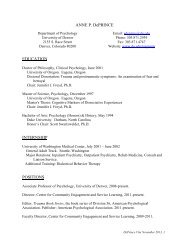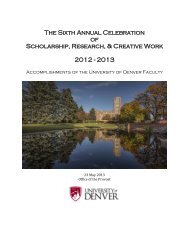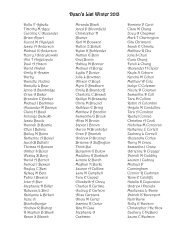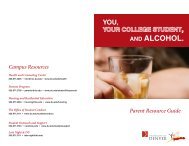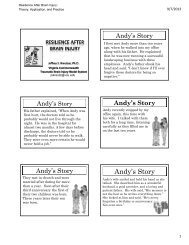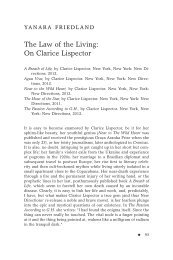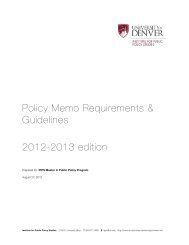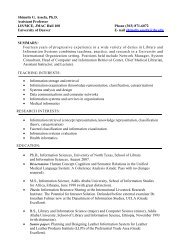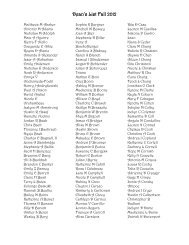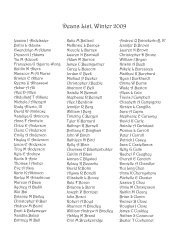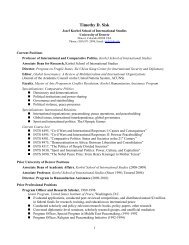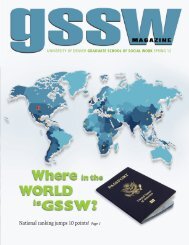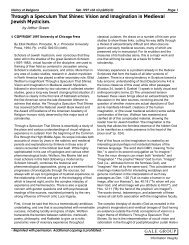Chien-Kai Chen, “China and Taiwan: A Future of Peace? A Study of ...
Chien-Kai Chen, “China and Taiwan: A Future of Peace? A Study of ...
Chien-Kai Chen, “China and Taiwan: A Future of Peace? A Study of ...
Create successful ePaper yourself
Turn your PDF publications into a flip-book with our unique Google optimized e-Paper software.
China <strong>and</strong> <strong>Taiwan</strong>: A <strong>Future</strong> <strong>of</strong> <strong>Peace</strong>? - 20<br />
China <strong>and</strong> the manufacturers who move their factories to China benefit from the growing<br />
economic ties, farmers <strong>and</strong> unskilled workers do not. It is also obvious that the beneficiaries,<br />
who are generally called “<strong>Taiwan</strong>ese businesspeople in China,” always press the <strong>Taiwan</strong>ese<br />
government for more economic ties across the <strong>Taiwan</strong> Strait <strong>and</strong> become increasingly politically<br />
influential not only due to the increase in their population <strong>and</strong> economic power, but also because<br />
<strong>of</strong> the important roles they play in <strong>Taiwan</strong>’s economic development. <strong>Taiwan</strong>ese policy makers<br />
<strong>and</strong> politicians are pressured from both sides <strong>and</strong> trapped in a dilemma <strong>of</strong> more openness or more<br />
restrictions.<br />
Having demonstrated that growing economic ties do have an effect on <strong>Taiwan</strong>’s domestic<br />
politics, it is time to link the economic ties across the <strong>Taiwan</strong> Strait to China-<strong>Taiwan</strong> relations<br />
through <strong>Taiwan</strong>’s domestic politics. I do this by examining whether the growing China-<strong>Taiwan</strong><br />
economic ties politically benefit pro-Chinese identity politicians in <strong>Taiwan</strong>’s domestic politics,<br />
especially in the presidential elections. In the remaining part <strong>of</strong> this section, I will examine how<br />
economic ties between China <strong>and</strong> <strong>Taiwan</strong> led to the emergence <strong>of</strong> <strong>and</strong> change in the two political<br />
coalitions – the coalition <strong>of</strong> Pan-Green with <strong>Taiwan</strong>ese farmers <strong>and</strong> unskilled workers <strong>and</strong> the<br />
coalition <strong>of</strong> Pan-Blue with <strong>Taiwan</strong>ese businesspeople in China – during the 2000, 2004 <strong>and</strong> 2008<br />
<strong>Taiwan</strong>ese presidential elections, <strong>and</strong> its implications for the China-<strong>Taiwan</strong> relations.<br />
Political Coalitions in <strong>Taiwan</strong>’s Presidential Elections from 2000 to 2004<br />
The political cleavage between the people who were benefiting from <strong>Taiwan</strong>’s economic ties<br />
with China <strong>and</strong> the people who were not was not obvious in the 2000 presidential election<br />
because the economic exchanges between China <strong>and</strong> <strong>Taiwan</strong> during that time were suppressed by<br />
the policy <strong>of</strong> “don’t haste, be patient.” The policy was originally implemented by Lee Teng-Hui<br />
in 1996 <strong>and</strong> imposed many restrictions on the economic exchanges between China <strong>and</strong> <strong>Taiwan</strong>.<br />
During that time there was no obvious winner or loser in the cross-strait economic ties in <strong>Taiwan</strong>,<br />
<strong>and</strong>, therefore, there was no dilemma <strong>of</strong> more openness or more restrictions for politicians.<br />
Actually, there was a popular sentiment among <strong>Taiwan</strong>ese in the late 1990s that these restrictions<br />
on cross-strait economic exchanges had a negative effect on <strong>Taiwan</strong>’s economic development<br />
because they made <strong>Taiwan</strong>’s information technology industry, which was the backbone <strong>of</strong><br />
<strong>Taiwan</strong>’s economic development, unable to access the cheap labor in China <strong>and</strong> thus become<br />
internationally uncompetitive. To respond to this popular sentiment, all three major c<strong>and</strong>idates in<br />
<strong>Taiwan</strong>’s 2000 presidential election – <strong>Chen</strong> Shui-Bian, Lien Chan, <strong>and</strong> James Soong – advocated<br />
the relaxation <strong>of</strong> restrictions on the cross-strait economic exchanges imposed by the “don’t haste,<br />
be patient” policy (Chu 2004, 507).<br />
After wining the 2000 presidential election, DPP’s <strong>Chen</strong> Shui-Bian <strong>of</strong>ficially replaced the<br />
“don’t haste, be patient” policy with the “active openness <strong>and</strong> effective management” policy in<br />
October 2001. Its implementation greatly increased the level <strong>of</strong> the economic exchanges between<br />
China <strong>and</strong> <strong>Taiwan</strong> <strong>and</strong> in turn led to new political situations in <strong>Taiwan</strong>’s domestic politics.<br />
First, growing economic ties attracted more <strong>and</strong> more <strong>Taiwan</strong>ese capitalists to invest in <strong>and</strong><br />
manufacturers to move their factories to China. This created an obvious cleavage between the<br />
people who were benefiting from the economic ties <strong>and</strong> those who were not. While <strong>Taiwan</strong>ese<br />
businesspeople asked for more openness <strong>and</strong> the termination <strong>of</strong> bans on postal, transportation,<br />
<strong>and</strong> trade links between China <strong>and</strong> <strong>Taiwan</strong>, <strong>Taiwan</strong>ese farmers <strong>and</strong> unskilled workers began to<br />
worry that more economic openness <strong>and</strong> direct economic links between China <strong>and</strong> <strong>Taiwan</strong> might<br />
harm their economic interests. <strong>Taiwan</strong>ese businesspeople were attracted to the giant market <strong>and</strong>



